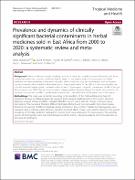Prevalence and dynamics of clinically significant bacterial contaminants in herbal medicines sold in East Africa from 2000 to 2020: a systematic review and meta analysis

View/
Date
2021-01-28Author
Kafeero, Hussein. M.
Walusansa, Abdul
Asiimwe, Savina
Iramiot, Stanley . J
Ssenku, Jamilu. E.
Nakavuma, Jesca. L.
Kakudidi, Esezah. K.
Metadata
Show full item recordAbstract
Background: Infectious diseases remain a leading cause of mortality and morbidity around the world, and those
caused by bacteria are common in the East African region. In this region, trade and consumption of herbal
medicine has been expanding in the recent decades. Herbal medicines may be contaminated with pathogenic
bacteria; however, there is limited information due to fragmented studies in East Africa. In this meta-analysis, we
critically analyzed original research related to the incidence of pathogenic bacterial contaminants of HM in the East
African region since 2000. The aim was to create a comprehensive understanding of the extent and dynamics of
bacterial contamination in HM, to guide future research and concerted public health protection in the region.
Methodology: The study was conducted according to the standards of the Preferred Reporting Items for
Systematic Reviews and Meta-analyses. We searched and evaluated published articles from eleven electronic
databases (Google Scholar, PubMed, HerbMed, MEDLINE, Science Direct, Scifinder Scholar, Cochrane Library,
International Pharmaceutical Abstracts, EMBASE, Biological Abstracts and Commonwealth Agricultural Bureau
Abstracts). Prevalences of different bacterial species, Cochran’s Q test, and the I2 statistic for heterogeneity were
evaluated using a software called MedCalcs. Random and fixed effects models were used to determine the pooled
prevalence of clinically significant bacteria from studies which were included in this meta-analysis. The potential
sources of heterogeneity were examined through sensitivity analysis, sub-group analysis, and meta-regression at
95% level of significance.
Results: Fourteen studies met our inclusion criteria. Overall, the studies were highly heterogeneous (I2 = 98.48%)
and there was no evidence of publication bias. Escherichia coli was the most prevalent contaminant. Salmonella spp.
and Shigella spp. were the most frequently reported primary pathogens with pooled prevalence of 10.4% and 6.3%,
respectively. Our findings are in tandem with recent systematic reviews conducted in Europe and Asia, but are in
discrepancy with the reviews recently conducted in southern Africa.
Conclusion and recommendations: The East African herbal medicine industry poses considerable health risks to
communities through dissemination of clinically significant bacteria. Presence of enteric bacterial contaminants
indicates possible fecal pollution of herbal medicine region-wide. Adequate research pertaining to microbial safety
of herbal medicine in the East African countries remains highly desired. The latter will enable establishment of
strong, region-wide herbal safety mechanisms in order to support comprehensive public health protection in East
Africa.
Collections
- Research Papers [57]
